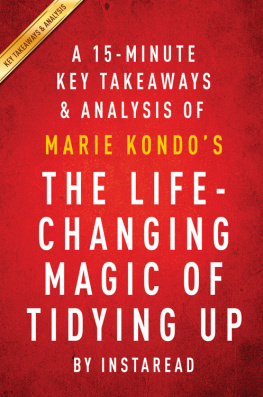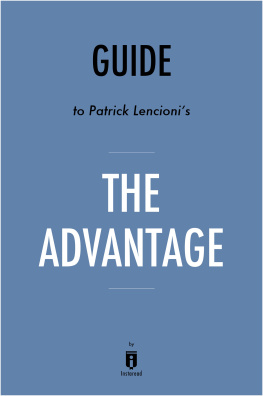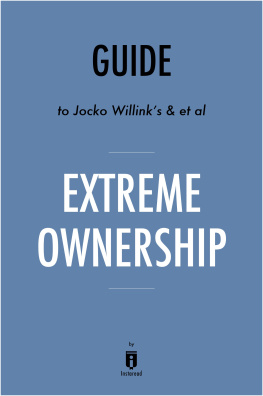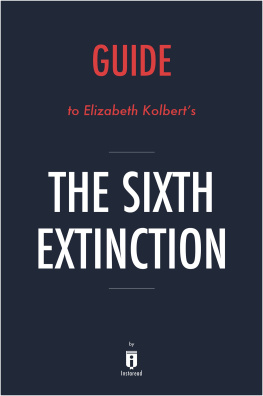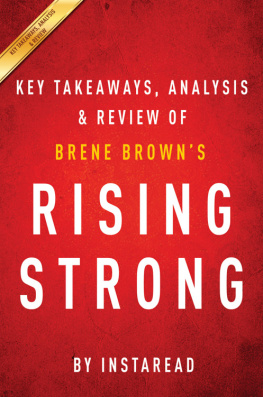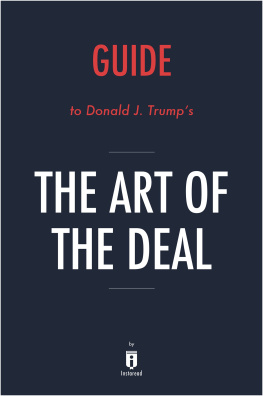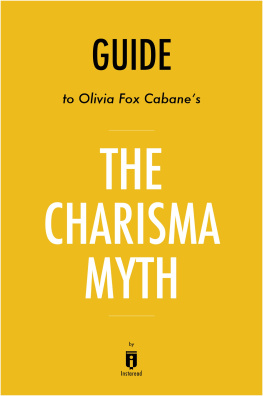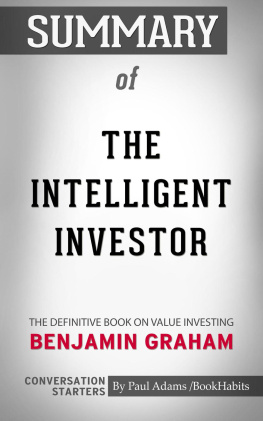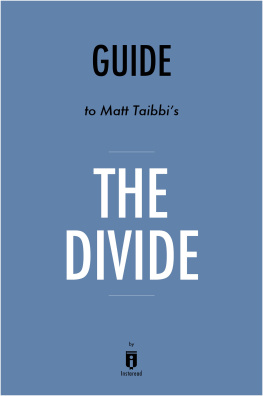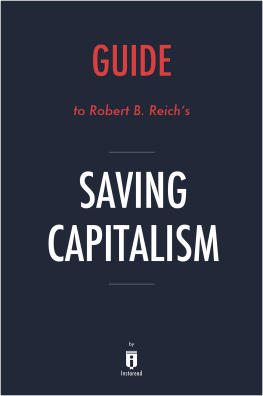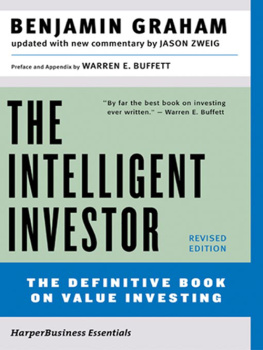Instaread - The Intelligent Investor: The Definitive Book on Value Investing by Benjamin Graham and Jason Zweig
Here you can read online Instaread - The Intelligent Investor: The Definitive Book on Value Investing by Benjamin Graham and Jason Zweig full text of the book (entire story) in english for free. Download pdf and epub, get meaning, cover and reviews about this ebook. year: 2015, publisher: iDreamBooks Inc, genre: Business. Description of the work, (preface) as well as reviews are available. Best literature library LitArk.com created for fans of good reading and offers a wide selection of genres:
Romance novel
Science fiction
Adventure
Detective
Science
History
Home and family
Prose
Art
Politics
Computer
Non-fiction
Religion
Business
Children
Humor
Choose a favorite category and find really read worthwhile books. Enjoy immersion in the world of imagination, feel the emotions of the characters or learn something new for yourself, make an fascinating discovery.
The Intelligent Investor: The Definitive Book on Value Investing by Benjamin Graham and Jason Zweig: summary, description and annotation
We offer to read an annotation, description, summary or preface (depends on what the author of the book "The Intelligent Investor: The Definitive Book on Value Investing by Benjamin Graham and Jason Zweig" wrote himself). If you haven't found the necessary information about the book — write in the comments, we will try to find it.
Inside this Instaread of The Intelligent Investor:
- Important People
- Key Takeaways
- Analysis of Key Takeaways
The Intelligent Investor: The Definitive Book on Value Investing by Benjamin Graham and Jason Zweig — read online for free the complete book (whole text) full work
Below is the text of the book, divided by pages. System saving the place of the last page read, allows you to conveniently read the book "The Intelligent Investor: The Definitive Book on Value Investing by Benjamin Graham and Jason Zweig" online for free, without having to search again every time where you left off. Put a bookmark, and you can go to the page where you finished reading at any time.
Font size:
Interval:
Bookmark:
Guide to
Benjamin Grahams & et al
The Intelligent Investor
The Definitive Book on Value Investing
by
Instaread
Please Note
This is a companion to the original book.
Copyright 2015 by Instaread. All rights reserved worldwide. No part of this publication may be reproduced or transmitted in any form without the prior written consent of the publisher.
Limit of Liability/Disclaimer of Warranty: The publisher and author make no representations or warranties with respect to the accuracy or completeness of these contents and disclaim all warranties such as warranties of fitness for a particular purpose. The author or publisher is not liable for any damages whatsoever. The fact that an individual or organization is referred to in this document as a citation or source of information does not imply that the author or publisher endorses the information that the individual or organization provided. This concise companion is unofficial and is not authorized, approved, licensed, or endorsed by the original books author or publisher.
Table of Contents
The Intelligent Investor: The Definitive Book on Value Investing by Benjamin Graham, with commentary by Jason Zweig, is a thorough guide to the principles of portfolio creation, cost management, stock and bond picking, and stock ownership for the defensive, long-term investor.
Investors should split their portfolio between bonds and stock. The level of risk an investor should take depends on how much time they have to devote to research and management. The recommended percent of the portfolio that can be spent on higher-risk transactions should not exceed ten.
Many people buy a stock when it has already started to rise above its best price and sell when it has already fallen below its peak. This cuts into profits, as do transaction fees, taxes, and adviser fees. To avoid buying a stock when it is already too expensive to offer a good, long term return, investors should define their preferred price-to-average earnings ratio. In order to make as many purchases at optimal prices throughout the year as possible, investors should devote a set dollar amount to invest each month, which is called dollar-cost averaging.
Good strategies for investment include finding well managed funds, getting advice or a qualified manager, reading deeply into the numbers of corporate financial statements, seeking stocks that demonstrate consistent dividend payments and asset value, and limiting risk by setting a price that will best guarantee results even if projections turn out to be overinflated. Investors should not fall for the hype, take recommendations without doing independent research, or think that past performance guarantees future growth.
Benjamin Graham: Benjamin Graham was an investor and teacher at Columbia Business School. With fellow Columbia teacher, David Dodd, Graham developed a defensive investing strategy following the 1929 Wall Street crash, and went on to publish six books with several reprints.
Jason Zweig: Jason Zweig writes for Money magazine. He has written several books based on conservative investing strategies, including books based on the writings of Benjamin Graham.
Warren Buffett: Warren Buffett is one of the world's wealthiest people, CEO and chairman of Berkshire Hathaway, and a widely admired investor. Graham and Dodd's work influenced him deeply when he began investing.
David Dodd: David Dodd was an instructor at Columbia Business School when he became a co-author of several books on value investing with Graham. He was also a partner in the hedge fund and investment trust founded by Graham.
- Value investing is a defensive investing strategy that concentrates on long term investments, a portfolio balanced between bonds and stocks, and low risk.
- Strategies, such as dollar-cost averaging, price-to-earnings ratios, and margins of safety, help investors set spending limits to minimize their losses.
- The modern stock market favors speculation over investing and includes a large population of emotional, inpatient stock buyers. They tend to purchase a stock when it has already risen in value above its ideal price-to-earnings ratio, and sell it when it has already fallen from its highest price.
- Investors with little time or interest to devote to their portfolios should invest primarily in mutual fund shares or index funds. After thorough research, investors may choose to have someone else manage their portfolios if no fund available offers the portfolio they want.
- Even aggressive investors should exercise caution when considering second-grade stocks, preferred stocks, foreign bonds, new issues, junk bonds, day trading, initial public offerings, convertible bonds, and call options.
- Past performance, predictions on industry growth, and projections have proven time and again not to guarantee growth in investments.
- Low-risk stock picking should screen out any company that does not meet the seven criteria for a well-capitalized business with high-performing shares at low prices. Stock picking with a higher level of acceptable risk may consider companies that meet fewer of the criteria, as long as the prices are appropriate.
- Corporate accountants have many ways of manipulating figures for losses, taxes, and stock options to show an earnings-per-share increase where there was none. Investors should be certain to inform themselves of the context behind report numbers.
- Stockholders are part owners of businesses with the ability to change management through their proxy votes, as long as they communicate and organize in their interests. Companies sometimes try to talk them out of dividend payments, which is not in the investor's best interests.
Value investing is a defensive investing strategy that concentrates on long term investments, a portfolio balanced between bonds and stocks, and low risk.
Analysis
Value investing is a style of investing that focuses on long term investments with a high probability of returns, rather than long shots that an investor hopes will demonstrate growth within a month or less. A value investor should only manage their portfolio a few times a year and should be disconnected from daily stock ticker prices. The value investor does not constantly seek out new investment opportunities or new share issues, particularly when those opportunities are untested.
The frantic pace of traders on the stock market floor and the ever-faster trading by digital connection are completely at odds with the value investing approach. It may be less glamorous, considering the reputations of traders who made their fortunes on the undervalued opportunity that they knew would be the next Google or Microsoft. However, the value investor is a person who seeks to make enough for their purposes, not the most money anyone ever made in a single stock transaction, so the glamor of day trading holds less appeal and the risk of losses is a greater deterrent. A day trader or a speculator may see the value investor's portfolio as too small and too limited in range to provide market beating returns. Popular belief asserts that a portfolio should include a range of valuable stocks still on their way up, necessitating a large investment up front and the belief that none of those stocks are already near their peaks, or a selection of small companies' new issues or initial public offerings, to try to catch a future technology giant while it is still small. In reality, neither of those portfolios is likely to provide returns at all, since getting into any already valuable stock could mean being atop a market bubble when it bursts and the vast majority of potential market giants-in-the-making never live up to that potential. In comparison, value investing seeks the safe choices and still delivers substantial returns.
Next pageFont size:
Interval:
Bookmark:
Similar books «The Intelligent Investor: The Definitive Book on Value Investing by Benjamin Graham and Jason Zweig»
Look at similar books to The Intelligent Investor: The Definitive Book on Value Investing by Benjamin Graham and Jason Zweig. We have selected literature similar in name and meaning in the hope of providing readers with more options to find new, interesting, not yet read works.
Discussion, reviews of the book The Intelligent Investor: The Definitive Book on Value Investing by Benjamin Graham and Jason Zweig and just readers' own opinions. Leave your comments, write what you think about the work, its meaning or the main characters. Specify what exactly you liked and what you didn't like, and why you think so.


